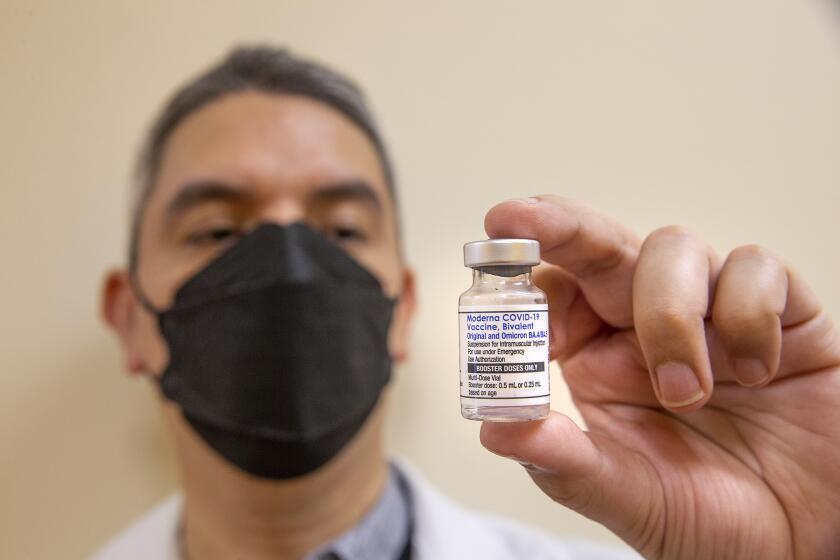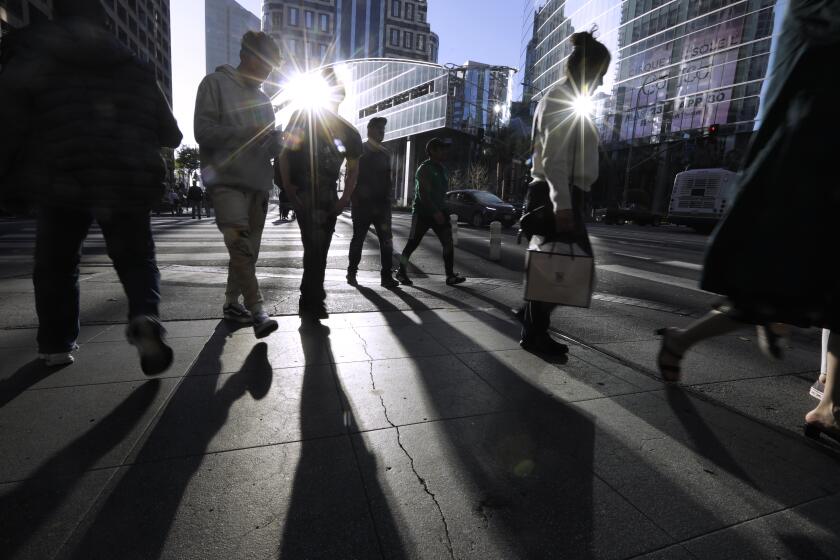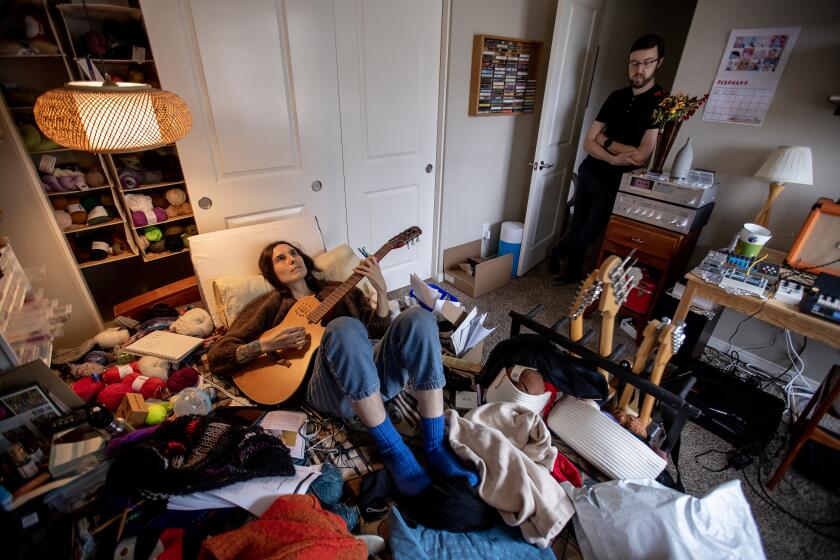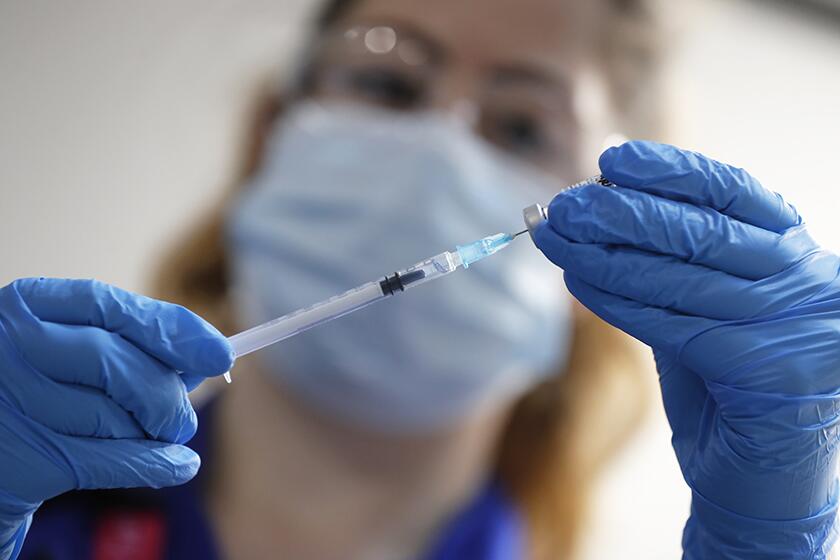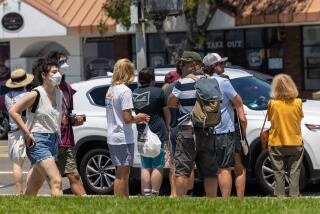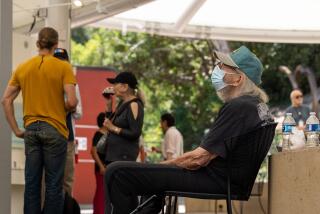Arcturus, a more infectious COVID subvariant, grows in L.A. County, seen in sewage

- Share via
Coronavirus levels in Los Angeles County wastewater have ticked up, potentially as a result of the arrival of a more infectious Omicron subvariant dubbed Arcturus.
The latest strain, known officially as XBB.1.16, is probably responsible for a rise in coronavirus cases in India, where there have been a number of anecdotal reports of what had been a rare COVID-19 symptom, especially in children: pinkeye.
Arcturus has been making up a greater percentage of coronavirus cases nationwide. It comprised an estimated 10% of U.S. cases for the week that ended Saturday; the prior week, it was about 6%; and the week before that, it was 3%.
The California Department of Public Health estimates Arcturus comprises about 7% of coronavirus cases for the same week. At least three Arcturus cases have been identified in L.A. County, the agency said Thursday.
It’s too early to say whether Arcturus is associated with a greater rate of pinkeye than older coronavirus variants.
But the health agency said people “should be aware that itchy, watery or red eyes may be a sign of COVID-19 infection, and these symptoms should not simply be dismissed as a result of pollen or seasonal allergies, especially if someone more vulnerable to severe illness could be exposed.”
The U.S. Centers for Disease Control and Prevention recommended the allowance of an additional updated booster for seniors 65 and older as well as those who are immunocompromised.
Pinkeye, also known as conjunctivitis, can lead to eye damage if untreated. Officials urge people to use at-home coronavirus tests to determine whether they are infected.
The increase in wastewater levels in L.A. County may be an early indication of increased spread of the coronavirus, health officials said, although reported cases are still relatively stable, as are hospitalizations and deaths. For the most recent week, there were 54 COVID-19 deaths reported in Los Angeles County. There were 44 deaths reported the prior week, and the week before that, 59.
Public Health Director Barbara Ferrer said that because Arcturus is related to recent strains of the coronavirus, it is expected that vaccines and anti-COVID therapeutic drugs such as Paxlovid will still be quite effective against severe illness and death.
“Although we are facing the reality of a new Omicron strain gaining dominance and it is not yet possible to predict the impact, I am confident that the tools available to us — including vaccines, therapeutics and testing — can limit bad outcomes,” Ferrer said in a statement Thursday.
Arcturus, also known as XBB.1.16, has also attracted attention after reports linking it to what has been a rare COVID-19 symptom: pink eye.
That said, it remains important that people get the updated COVID-19 vaccination. Only about 40% of L.A. County seniors 65 and older have received the updated COVID-19 vaccination, which was introduced in September.
COVID-19 remains a significant cause of death, even as the intensity of the pandemic has dropped considerably. In 2022, COVID-19 was the third leading cause of death in Los Angeles County, behind coronary heart disease and Alzheimer’s disease, according to a preliminary data analysis by the Department of Public Health.
The rest of the leading causes of death in L.A. County last year were stroke, diabetes, chronic obstructive pulmonary disease, lung cancer, unintentional drug overdose, hypertension and pneumonia/flu.
However, COVID-19’s third-place ranking represents an improvement since 2021, when the illness was the leading cause of death. In 2020, COVID-19 was the second leading cause of death, trailing coronary heart disease.
Those results demonstrate how the risk of COVID-19 to the general population has declined. Vaccinations became plentiful by mid-2021, and anti-COVID therapeutic drugs by mid-2022.
About 260,000 COVID-19 deaths were reported nationally in 2022. There were about 472,000 deaths in 2021, and about 355,000 deaths in 2020. More than 40,000 COVID-19 deaths have been reported nationally this year.
Older people who are unvaccinated or not up to date on their vaccinations are the most likely to die from COVID-19.
Although some health experts are wearing masks less often, given lower coronavirus transmission levels, they say they still try to take reasonable steps to avoid infection. Reducing the risk of infection is especially important if you’re older, in a higher risk group or have an underlying health condition.
If you get a coronavirus infection, “you still have to isolate for five days, so it’s kind of a bummer,” said Dr. Peter Chin-Hong, a UC San Francisco infectious diseases expert.
That said, Chin-Hong said he no longer has a problem dining at indoor restaurants.
“And probably the only times I might wear my mask is in the hospital setting,” and perhaps on an airplane, he said, noting that he donned a mask on a recent flight where he was near a group of passengers who came back from Europe “and they were all hacking and coughing, and none of them were wearing masks.”
Three years and $62,000 in medical expenses later, a musician and her caregiving partner struggle to navigate the financial, mental and physical challenges of long COVID.
State epidemiologist Dr. Erica Pan said in a recent briefing that if she sees increases in COVID-19, she’ll probably still test her family before they have an indoor meal with her parents.
And in an interview last week, Ferrer said that while she is now more likely to eat in an indoor restaurant than before, she’d want to do it in a well-ventilated place that isn’t crowded. She said she feels comfortable going to sporting events and concerts, although she might have her mask on if it’s very crowded or she’s inside.
“I, like others, have activities that I enjoy and people I enjoy being with. And I want to, as much as possible, find ways to do that,” Ferrer said. “I’m in one of those categories of folks that are at higher risk. So I want to be reasonable about this and, where possible, reduce risks, but get on with being able to do a lot of the things I really love to do.”
With widespread access to updated vaccines and anti-COVID therapeutics, “what I think is different right now is we have a lot more protection,” Ferrer said. “So we need to balance reducing our risk with not remaining too isolated from the people or the activities we love.”
California wildlife officials have confirmed the state’s first case of COVID-19 in a wild animal, detected in a mule deer killed in 2021 in El Dorado County.
Deciding what risks to take is a personal choice, she said.
“None of us should be judgmental,” Ferrer said. “It’s still important for people at higher risk to reduce risk in reasonable ways, wherever they see that it would be appropriate.”
Springtime is when coronavirus cases have generally been low.
That “means that your chances of bumping into somebody who is positive with COVID-19 is reduced,” Ferrer said. “And if you go to a restaurant inside that’s well-ventilated, that’s not super-crowded, your chances of having an exposure are certainly a lot less than they are when our transmission rates are higher.”
To control spread, it’s important to test, especially if you have symptoms.
Hiltzik: Anti-vaxxers loved to cite this study of COVID vaccine deaths. Now it’s been retracted
An academic study purporting to find 278,000 deaths from COVID vaccinations thrilled the anti-vaccine crowd. The failings that led to its retraction have a lot to teach us about bogus science.
When the national public health emergency ends on May 11, the federal requirement that health insurers reimburse policyholders for eight over-the-counter rapid COVID tests per month will also go away.
But even after May 11, many Californians will still have access to tests, whose costs must be reimbursed by their insurer. Thanks to SB 510 and SB 1473, each person insured under health plans regulated by the state Department of Managed Health Care will still be required to cover the costs of eight over-the-counter rapid tests a month. This includes health coverage many get from their employers, as well as Medi-Cal-managed plans and Covered California plans.
Starting Nov. 11, insurers regulated by the state Department of Managed Health Care still must cover COVID tests if they’re provided in-network, but can charge for tests purchased out-of-network.
Free at-home tests also are available at a number of sites in L.A. County, including county libraries, vaccination sites run by the county Department of Public Health and food banks and senior centers. L.A. County seniors 65 and older or people unable to leave their home can request two free tests be mailed to them.
L.A. County residents who need help accessing COVID-19 resources can call (833) 540-0473, seven days a week, from 8 a.m. to 8:30 p.m.
